Destabilization in Libya: A Hotbed for Transnational Organized Crime
VerifiedAdded on 2023/06/11
|5
|1066
|69
Project
AI Summary
This project examines the relationship between the destabilization of Libya and the proliferation of transnational organized crime. It argues that the Libyan crisis has transformed the country into a hub for illegal activities, including the training of terrorist groups, arms and drug trafficking, and human trafficking. The analysis highlights how porous borders and the exploitation of migrants contribute to these criminal enterprises. The paper also addresses the detrimental consequences of these crimes on the United States, particularly in terms of financial costs and potential terrorist threats. Finally, the project proposes a multi-step action plan involving international collaboration, addressing socio-economic issues, and restoring political stability to combat transnational organized crime effectively.
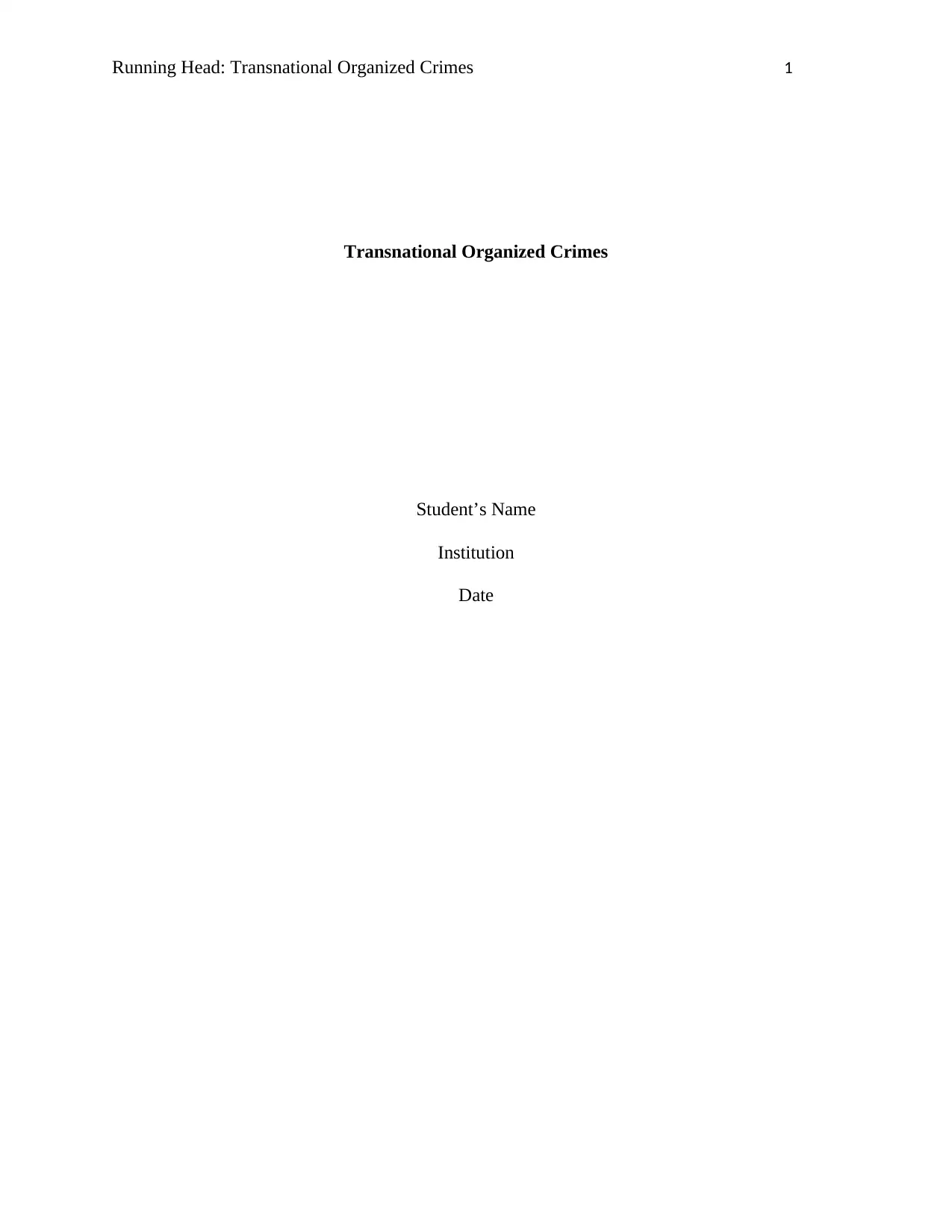
Running Head: Transnational Organized Crimes 1
Transnational Organized Crimes
Student’s Name
Institution
Date
Transnational Organized Crimes
Student’s Name
Institution
Date
Paraphrase This Document
Need a fresh take? Get an instant paraphrase of this document with our AI Paraphraser
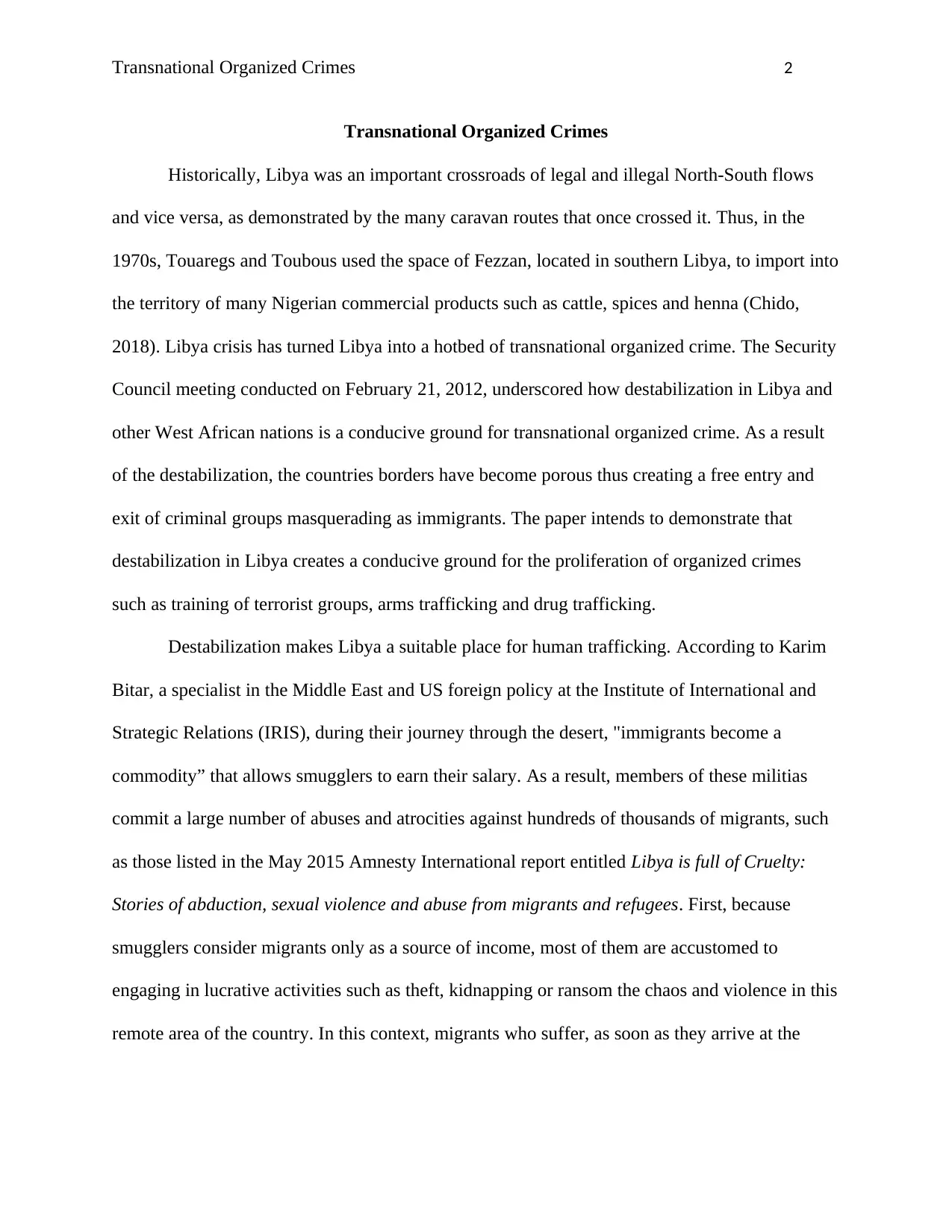
Transnational Organized Crimes 2
Transnational Organized Crimes
Historically, Libya was an important crossroads of legal and illegal North-South flows
and vice versa, as demonstrated by the many caravan routes that once crossed it. Thus, in the
1970s, Touaregs and Toubous used the space of Fezzan, located in southern Libya, to import into
the territory of many Nigerian commercial products such as cattle, spices and henna (Chido,
2018). Libya crisis has turned Libya into a hotbed of transnational organized crime. The Security
Council meeting conducted on February 21, 2012, underscored how destabilization in Libya and
other West African nations is a conducive ground for transnational organized crime. As a result
of the destabilization, the countries borders have become porous thus creating a free entry and
exit of criminal groups masquerading as immigrants. The paper intends to demonstrate that
destabilization in Libya creates a conducive ground for the proliferation of organized crimes
such as training of terrorist groups, arms trafficking and drug trafficking.
Destabilization makes Libya a suitable place for human trafficking. According to Karim
Bitar, a specialist in the Middle East and US foreign policy at the Institute of International and
Strategic Relations (IRIS), during their journey through the desert, "immigrants become a
commodity” that allows smugglers to earn their salary. As a result, members of these militias
commit a large number of abuses and atrocities against hundreds of thousands of migrants, such
as those listed in the May 2015 Amnesty International report entitled Libya is full of Cruelty:
Stories of abduction, sexual violence and abuse from migrants and refugees. First, because
smugglers consider migrants only as a source of income, most of them are accustomed to
engaging in lucrative activities such as theft, kidnapping or ransom the chaos and violence in this
remote area of the country. In this context, migrants who suffer, as soon as they arrive at the
Transnational Organized Crimes
Historically, Libya was an important crossroads of legal and illegal North-South flows
and vice versa, as demonstrated by the many caravan routes that once crossed it. Thus, in the
1970s, Touaregs and Toubous used the space of Fezzan, located in southern Libya, to import into
the territory of many Nigerian commercial products such as cattle, spices and henna (Chido,
2018). Libya crisis has turned Libya into a hotbed of transnational organized crime. The Security
Council meeting conducted on February 21, 2012, underscored how destabilization in Libya and
other West African nations is a conducive ground for transnational organized crime. As a result
of the destabilization, the countries borders have become porous thus creating a free entry and
exit of criminal groups masquerading as immigrants. The paper intends to demonstrate that
destabilization in Libya creates a conducive ground for the proliferation of organized crimes
such as training of terrorist groups, arms trafficking and drug trafficking.
Destabilization makes Libya a suitable place for human trafficking. According to Karim
Bitar, a specialist in the Middle East and US foreign policy at the Institute of International and
Strategic Relations (IRIS), during their journey through the desert, "immigrants become a
commodity” that allows smugglers to earn their salary. As a result, members of these militias
commit a large number of abuses and atrocities against hundreds of thousands of migrants, such
as those listed in the May 2015 Amnesty International report entitled Libya is full of Cruelty:
Stories of abduction, sexual violence and abuse from migrants and refugees. First, because
smugglers consider migrants only as a source of income, most of them are accustomed to
engaging in lucrative activities such as theft, kidnapping or ransom the chaos and violence in this
remote area of the country. In this context, migrants who suffer, as soon as they arrive at the
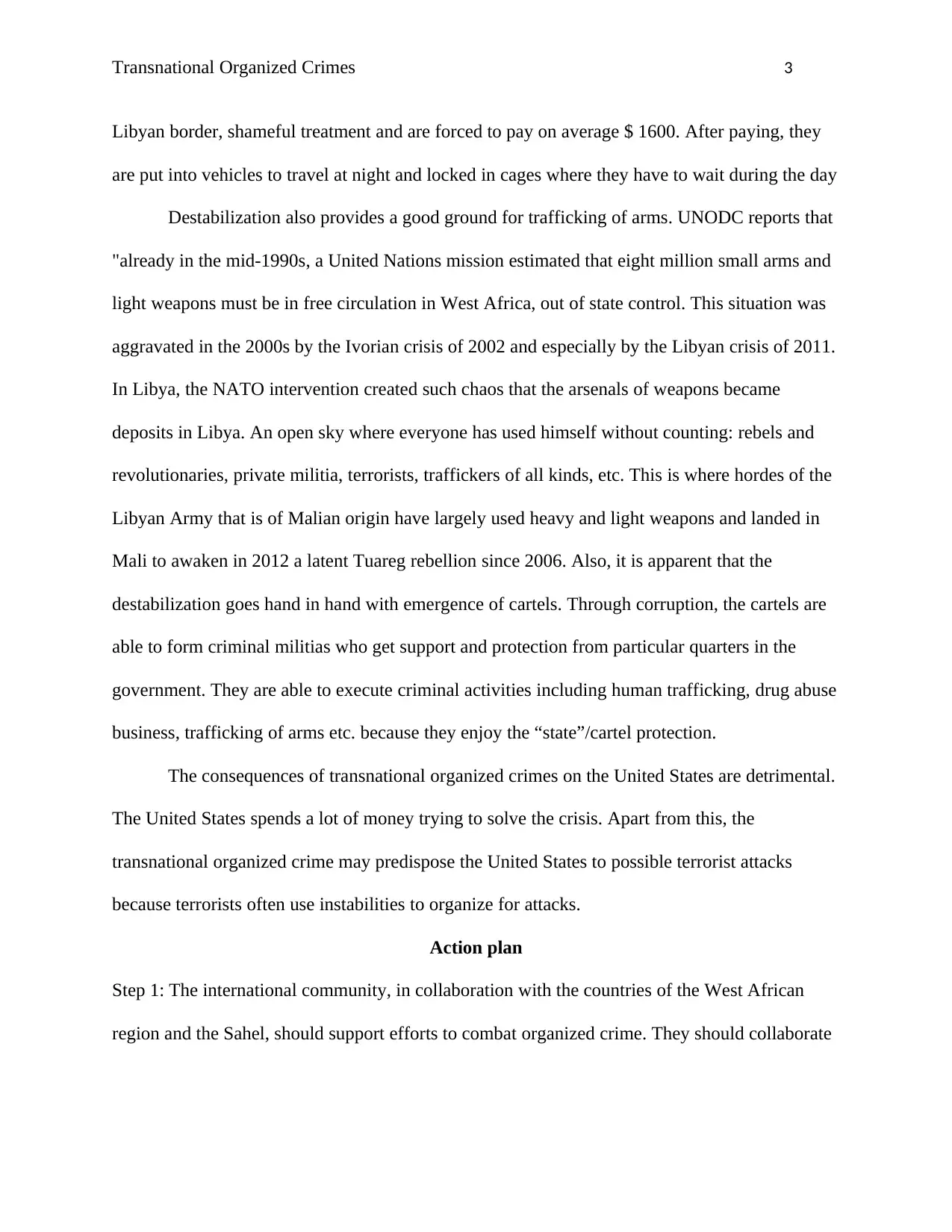
Transnational Organized Crimes 3
Libyan border, shameful treatment and are forced to pay on average $ 1600. After paying, they
are put into vehicles to travel at night and locked in cages where they have to wait during the day
Destabilization also provides a good ground for trafficking of arms. UNODC reports that
"already in the mid-1990s, a United Nations mission estimated that eight million small arms and
light weapons must be in free circulation in West Africa, out of state control. This situation was
aggravated in the 2000s by the Ivorian crisis of 2002 and especially by the Libyan crisis of 2011.
In Libya, the NATO intervention created such chaos that the arsenals of weapons became
deposits in Libya. An open sky where everyone has used himself without counting: rebels and
revolutionaries, private militia, terrorists, traffickers of all kinds, etc. This is where hordes of the
Libyan Army that is of Malian origin have largely used heavy and light weapons and landed in
Mali to awaken in 2012 a latent Tuareg rebellion since 2006. Also, it is apparent that the
destabilization goes hand in hand with emergence of cartels. Through corruption, the cartels are
able to form criminal militias who get support and protection from particular quarters in the
government. They are able to execute criminal activities including human trafficking, drug abuse
business, trafficking of arms etc. because they enjoy the “state”/cartel protection.
The consequences of transnational organized crimes on the United States are detrimental.
The United States spends a lot of money trying to solve the crisis. Apart from this, the
transnational organized crime may predispose the United States to possible terrorist attacks
because terrorists often use instabilities to organize for attacks.
Action plan
Step 1: The international community, in collaboration with the countries of the West African
region and the Sahel, should support efforts to combat organized crime. They should collaborate
Libyan border, shameful treatment and are forced to pay on average $ 1600. After paying, they
are put into vehicles to travel at night and locked in cages where they have to wait during the day
Destabilization also provides a good ground for trafficking of arms. UNODC reports that
"already in the mid-1990s, a United Nations mission estimated that eight million small arms and
light weapons must be in free circulation in West Africa, out of state control. This situation was
aggravated in the 2000s by the Ivorian crisis of 2002 and especially by the Libyan crisis of 2011.
In Libya, the NATO intervention created such chaos that the arsenals of weapons became
deposits in Libya. An open sky where everyone has used himself without counting: rebels and
revolutionaries, private militia, terrorists, traffickers of all kinds, etc. This is where hordes of the
Libyan Army that is of Malian origin have largely used heavy and light weapons and landed in
Mali to awaken in 2012 a latent Tuareg rebellion since 2006. Also, it is apparent that the
destabilization goes hand in hand with emergence of cartels. Through corruption, the cartels are
able to form criminal militias who get support and protection from particular quarters in the
government. They are able to execute criminal activities including human trafficking, drug abuse
business, trafficking of arms etc. because they enjoy the “state”/cartel protection.
The consequences of transnational organized crimes on the United States are detrimental.
The United States spends a lot of money trying to solve the crisis. Apart from this, the
transnational organized crime may predispose the United States to possible terrorist attacks
because terrorists often use instabilities to organize for attacks.
Action plan
Step 1: The international community, in collaboration with the countries of the West African
region and the Sahel, should support efforts to combat organized crime. They should collaborate
⊘ This is a preview!⊘
Do you want full access?
Subscribe today to unlock all pages.

Trusted by 1+ million students worldwide
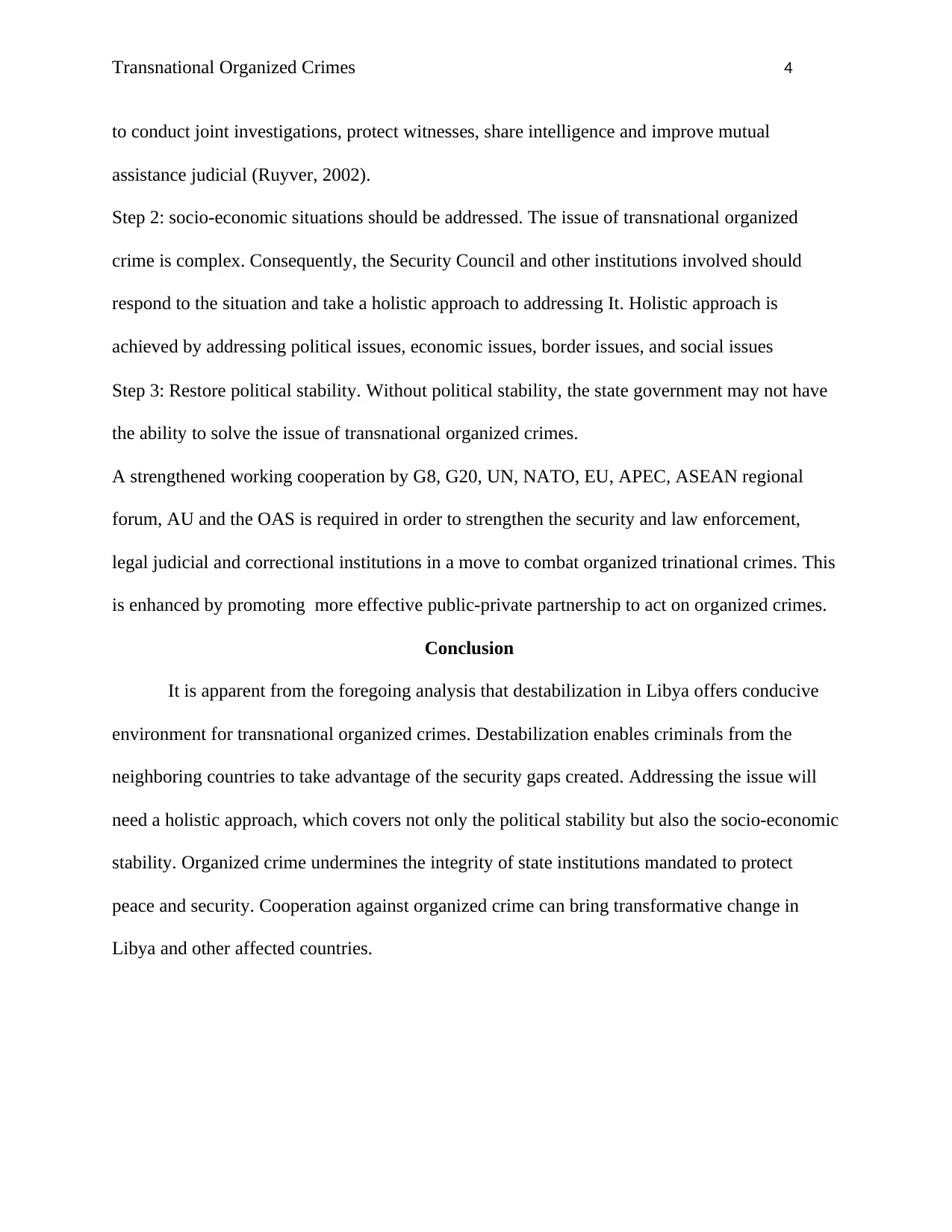
Transnational Organized Crimes 4
to conduct joint investigations, protect witnesses, share intelligence and improve mutual
assistance judicial (Ruyver, 2002).
Step 2: socio-economic situations should be addressed. The issue of transnational organized
crime is complex. Consequently, the Security Council and other institutions involved should
respond to the situation and take a holistic approach to addressing It. Holistic approach is
achieved by addressing political issues, economic issues, border issues, and social issues
Step 3: Restore political stability. Without political stability, the state government may not have
the ability to solve the issue of transnational organized crimes.
A strengthened working cooperation by G8, G20, UN, NATO, EU, APEC, ASEAN regional
forum, AU and the OAS is required in order to strengthen the security and law enforcement,
legal judicial and correctional institutions in a move to combat organized trinational crimes. This
is enhanced by promoting more effective public-private partnership to act on organized crimes.
Conclusion
It is apparent from the foregoing analysis that destabilization in Libya offers conducive
environment for transnational organized crimes. Destabilization enables criminals from the
neighboring countries to take advantage of the security gaps created. Addressing the issue will
need a holistic approach, which covers not only the political stability but also the socio-economic
stability. Organized crime undermines the integrity of state institutions mandated to protect
peace and security. Cooperation against organized crime can bring transformative change in
Libya and other affected countries.
to conduct joint investigations, protect witnesses, share intelligence and improve mutual
assistance judicial (Ruyver, 2002).
Step 2: socio-economic situations should be addressed. The issue of transnational organized
crime is complex. Consequently, the Security Council and other institutions involved should
respond to the situation and take a holistic approach to addressing It. Holistic approach is
achieved by addressing political issues, economic issues, border issues, and social issues
Step 3: Restore political stability. Without political stability, the state government may not have
the ability to solve the issue of transnational organized crimes.
A strengthened working cooperation by G8, G20, UN, NATO, EU, APEC, ASEAN regional
forum, AU and the OAS is required in order to strengthen the security and law enforcement,
legal judicial and correctional institutions in a move to combat organized trinational crimes. This
is enhanced by promoting more effective public-private partnership to act on organized crimes.
Conclusion
It is apparent from the foregoing analysis that destabilization in Libya offers conducive
environment for transnational organized crimes. Destabilization enables criminals from the
neighboring countries to take advantage of the security gaps created. Addressing the issue will
need a holistic approach, which covers not only the political stability but also the socio-economic
stability. Organized crime undermines the integrity of state institutions mandated to protect
peace and security. Cooperation against organized crime can bring transformative change in
Libya and other affected countries.
Paraphrase This Document
Need a fresh take? Get an instant paraphrase of this document with our AI Paraphraser
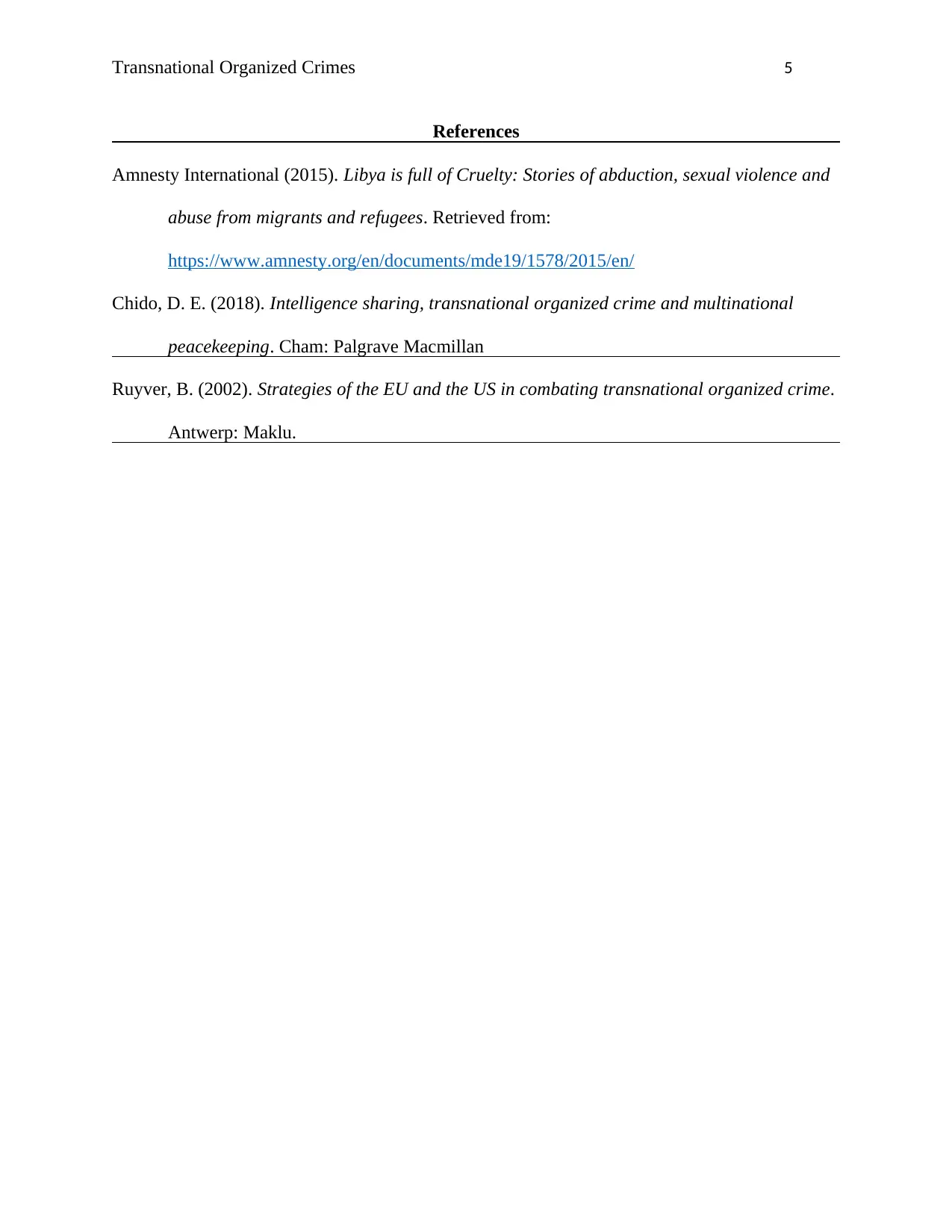
Transnational Organized Crimes 5
References
Amnesty International (2015). Libya is full of Cruelty: Stories of abduction, sexual violence and
abuse from migrants and refugees. Retrieved from:
https://www.amnesty.org/en/documents/mde19/1578/2015/en/
Chido, D. E. (2018). Intelligence sharing, transnational organized crime and multinational
peacekeeping. Cham: Palgrave Macmillan
Ruyver, B. (2002). Strategies of the EU and the US in combating transnational organized crime.
Antwerp: Maklu.
References
Amnesty International (2015). Libya is full of Cruelty: Stories of abduction, sexual violence and
abuse from migrants and refugees. Retrieved from:
https://www.amnesty.org/en/documents/mde19/1578/2015/en/
Chido, D. E. (2018). Intelligence sharing, transnational organized crime and multinational
peacekeeping. Cham: Palgrave Macmillan
Ruyver, B. (2002). Strategies of the EU and the US in combating transnational organized crime.
Antwerp: Maklu.
1 out of 5
Your All-in-One AI-Powered Toolkit for Academic Success.
+13062052269
info@desklib.com
Available 24*7 on WhatsApp / Email
![[object Object]](/_next/static/media/star-bottom.7253800d.svg)
Unlock your academic potential
Copyright © 2020–2026 A2Z Services. All Rights Reserved. Developed and managed by ZUCOL.